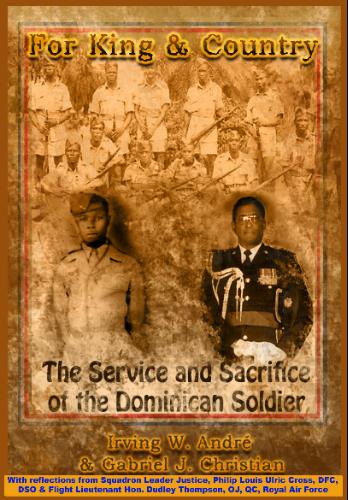Volume No. 2 Issue No. 40 - Monday May 26, 2008
We honor those who gallantly served
 Pond Case Press Pond Case Press


King and Country is the compelling story of Dominicans who served in the great wars.
|
What do Dominicans today know of their ancestors who flew over the skies of Europe, manned the beaches of our islands besieged by marauding German U-Boats, or went to Italy and Egypt to fight Adolph Hitler�s fascism in World War II? Precious little.
What does their legacy have to do with the modern Dominican nation? A great deal!
As we ponder the perils and promise of our 30 years of independence, these heroes who gave their lives for freedom in World War military service in Britain�s Army, Navy and Royal Air Force find new life and meaning in a newly released book from Pont Casse Press
For King & Country: The Service & Sacrifice of the Dominican Soldier. Many notable Dominicans in public and civic leadership today are the relatives - or offspring - of those who served in World War Two.
Many owe their patriotism to the values of service upon which they were nourished by their forbearers whose work hastened our independence and strengthened civic duty in our society.
The role of the British West Indian soldier in World Wars I and II has been seldom explored.
However, in this groundbreaking work, Irving W. Andre and Gabriel J. Christian, provide a fascinating history of British West Indian soldiers.
Revealed is the little known 1802 revolt by British West Indian soldiers against slave conditions at Fort Shirley, Dominica; World War I action by West Indian soldiers against Turkish forces in the Middle East;
Dominica�s purchase in World War I of Britain�s first Vickers Gnome aircraft christened, Dominica, which was later shot down over France; and West Indians in Royal Air Force (RAF) service as pilots, navigators, bomb aimers and ground crew during World War II.
Seldom written of, and revealed here, is the fact that 7,000 British West Indians served in the RAF during World War II, and the purchase of dozens of aircraft for the RAF by West Indians who raised such funds under harsh economic conditions.
This history is given a deeply personal touch as it is told through the words of two Dominican veterans who served in the British Army's South Caribbean Forces: Wendell Christian and Twistleton Bertrand.
We read also of Dominicans such as Harold Bryant, Osmunde St. Clair Alleyne, and L.A. McKoy who won high honors, to include the DFC, for their courage shown over the skies of battle torn Europe.
The role of the South Caribbean Forces in securing the islands during the U-Boat war unleashed by Germany on allied shipping in the Caribbean is reviewed in graphic detail.
To that end, it is revealed that the allies lost 400 ships to German U-Boats in the Battle of the Caribbean; with the Germans losing only 23 U-Boats in return.
We are also introduced to Trinidadian-born RAF Squadron Leader, Phillip Louis Ulric Cross, DFC, DSO: An ace navigator, he did 80 missions over occupied Europe in 139 (Jamaica) Squadron of RAF Bomber Command.
We also get an introduction to the fascinating life story of RAF Flight Lieutenant Dudley Thompson, who served in a Lancaster bomber, then went on to become a Rhodes Scholar at Oxford and an organizer of the Fifth Pan African Congress in Manchester.
He earned the nickname �Burning Spear� for having successfully defended nationalist leader Jomo Kenyatta of Kenya during that country�s independence struggle.
Thompson later served as Jamaica's Minister of Foreign Affairs and National Security in the cabinet of Michael Manley who, himself, served in the Royal Canadian Air Force during World War II.
Both Cross and Thompson, each 91 years of age, were interviewed for this book and have special sections dedicated to them.
The link between military service and political leadership is revealed in stark detail in this work, when one considers that Caribbean legends such as Norman Washington Manley, Milton Cato, Dr. Edward Scobie, Captain Arthur Cipriani, Tubal Uriah "Buzz" Butler, and Errol Barrow were all veterans of British military service in World Wars I and II.
Through the eyes of Wendell Christian and Twistleton Bertrand, we grasp the importance of such history in attaining a better understanding of the Caribbean's role in world affairs.
The story of the Dominican soldier is woven into the wider tableau of period history and the West Indian soldier at war for the British Empire.
In a world of unintended consequences, as with many African American soldiers who became leaders for social justice, the exposure of these British West Indian soldiers to war, hastened their transformation into activists for political independence.
As did African American soldiers like legendary lawyer Charles Hamilton Houston who was an artillery Captain in World War I and NAACP leader Medgar Evers, who served gallantly in the US army during the invasion at Normandy, France, in World War II, many former British West Indian service men and women became leaders in the newly independent Caribbean nations.
Today, that tradition of service continues to be in dire need in all spheres of life and the authors hope that the torch can be passed to a new generation of nation builders and civic leaders who put country ahead of selfish gain.
This fascinating book should find a place on the shelf of every student of world history. It also contains 50 rare photographs of British West Indians at war.
The book is available at Amazon.com and will soon be available on Dominica.
 E-mail to a friend E-mail to a friend

|
|





